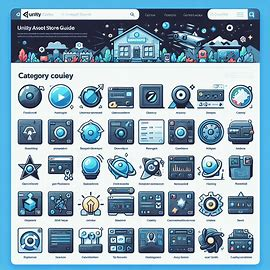Unlocking the Treasure Trove: Your Comprehensive Guide to the Unity Asset Store
Unity Asset Store Guide
1. Introduction to Unity Asset Store
The Unity Asset Store stands as a cornerstone for game developers and designers, presenting a widespread repository of assets, tools, and properties to streamline the game development process. Whether you're a seasoned developer or just starting, the Asset Store provides a treasure trove of solutions to enhance your projects.
2. Navigating the Unity Asset Store
Upon entering the Unity Asset Store, users are greeted with an intuitive interface designed for easy exploration. The homepage highlights featured assets, top downloads, and latest additions, while the search bar allows for specific queries.
3. Essential Categories within the Unity Asset Store
3.1. Scripts
Scripts serve as the backbone of Unity projects, enabling functionality and interactivity. From simple movement scripts to complex AI algorithms, the Script category offers a diverse range of solutions to fit various development needs.
3.2. Models and Prefabs
Visual assets such as models and prefabs populate this category, providing developers with ready-made objects to populate their game worlds. From characters and environments to props and vehicles, the Models section caters to all aesthetic requirements.
3.3. Textures and Materials
Texture and Material assets add depth and realism to game environments, allowing developers to craft visually stunning landscapes and characters. With a plethora of options available, creators can find textures and materials suitable for any style or theme.
3.4. Audio
Sound is an essential component of game design, setting the mood and enhancing the player experience. The Audio category offers music, sound effects, and ambient tracks to complement every genre and atmosphere.
4. Finding and Evaluating Assets
The Unity Asset Store provides various filters and sorting options to help users find the right asset for their projects. Ratings, reviews, and demos enable informed decisions, ensuring compatibility and quality.
5. Unity Asset Store Guidelines and Licensing
Before integrating assets into your project, it's crucial to understand the licensing agreements and usage rights associated with each asset. Unity provides clear guidelines to prevent copyright infringement and ensure ethical use of resources.
6. Using Assets Effectively in Unity Projects
Integrating assets seamlessly into Unity projects requires careful planning and organization. Proper file management, naming conventions, and asset optimization contribute to project efficiency and performance.
7. Tips for Asset Integration
To maximize the benefits of Unity assets, developers should consider factors such as scalability, modularity, and compatibility. Utilizing asset packages and dependencies effectively streamlines development and reduces overhead.
8. Exploring Free vs. Paid Assets
While free assets offer budget-friendly solutions, paid assets often provide higher quality and comprehensive support. Understanding the trade-offs between free and paid options helps developers make informed decisions based on project requirements and constraints.
9. Community and Support inside the Unity Asset Store
The Unity Asset Store fosters a vibrant community of developers and creators, offering forums, tutorials, and support channels for assistance and collaboration. Engaging with the community enhances learning and problem-solving skills.
10. Best Practices for Using Unity Assets
Adhering to best practices ensures smooth integration and long-term compatibility of Unity assets. Regular updates, version control, and documentation maintenance contribute to project stability and sustainability.
11. Case Studies: Successful Asset Implementation
Examining real-world examples of asset integration highlights best practices and potential pitfalls. Case studies provide valuable insights into asset selection, implementation strategies, and project outcomes.
12. Updates and Maintenance of Assets
Asset developers frequently release updates and patches to address bugs, add features, and improve performance. Staying informed about asset updates and maintaining compatibility with Unity versions is essential for long-term project success.
13. Common Pitfalls to Avoid
Despite the benefits of Unity assets, developers may encounter challenges such as compatibility issues, performance bottlenecks, and licensing violations. Awareness of common pitfalls helps mitigate risks and streamline development workflows.
14. Conclusion
In conclusion, the Unity Asset Store serves as a valuable resource for game developers, providing a diverse selection of tools, resources, and assets to enhance projects of all sizes and genres. By leveraging the power of the Asset Store, developers can expedite development cycles, improve game quality, and unlock creative possibilities.
15. FAQs
Can I use Unity assets in commercial projects?
- Yes, most assets on the Unity Asset Store come with licensing options suitable for commercial use. However, it's important to review the specific terms and conditions of each asset before integration.
Are Unity assets compatible with all Unity versions?
- Asset compatibility may vary depending on the asset developer's support policies and Unity version updates. It's advisable to check asset compatibility with your Unity version before purchase or integration.
How often are assets updated on the Unity Asset Store?
- The frequency of asset updates varies among developers. Some assets receive regular updates with new features and bug fixes, while others may have less frequent updates. Checking the asset's update history can provide insights into its maintenance schedule.
Can I sell my own assets on the Unity Asset Store?
- Yes, Unity provides a platform for developers to sell their own assets on the Unity Asset Store. Interested developers can review the submission guidelines and requirements on the Unity website.
Are there alternatives to the Unity Asset Store?
- While the Unity Asset Store remains a popular choice for developers, alternative platforms such as Unreal Engine Marketplace and Sketchfab offer similar services and resources tailored to specific development environments and workflows.












0 comments:
Post a Comment